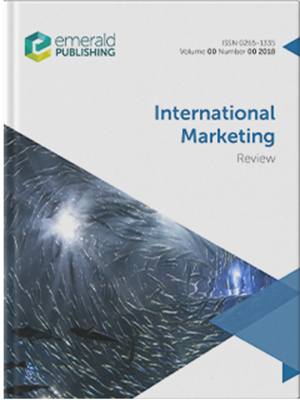Gaining legitimacy and host market acceptance: a CRM analysis for foreign subsidiaries in China
IF 4.6
3区 管理学
Q1 BUSINESS
引用次数: 0
Abstract
PurposeBuilding on the scant literature on how foreign subsidiaries strategize Cause-Related-Marketing (CRM) to gain legitimacy and acceptance in host markets, this paper investigated the impact of two CRM components (post-crisis recovery, CSR activities) on subsidiary performance and future opportunities in China, a country whose institutional development lags behind its economic achievements. The study also investigated the moderating effects of strategic mindset and subsidiary empowerment on CRM effects, issues highly relevant to MNCs and their subsidiaries.Design/methodology/approachTo minimize common method variance, the study adopted a multi-informant firm executive survey design that included responses from a director and a manager from 230 foreign subsidiaries operating in China. The director-level respondents assessed Firm Competences, Organizational Ties, Subsidiary Performance and Future Opportunities. The manager-level respondents assessed CSR activities (Legal, Ethical and Philanthropic CSR) and other operational measures.FindingsThe two CRM components affected Subsidiary Performance (sales, shares and profit) and Future Opportunities in different ways as postulated by legitimacy theory. While Post-crisis Recovery enhanced Subsidiary Performance (sales), it could not enhance Future Opportunities by itself unless the subsidiary received headquarters empowerment. Interestingly, only Ethical and Philanthropic CSR activities with enhancement from Strategic Mindset mattered to Future Opportunities.Originality/valueThe research unfolded key elements in how foreign subsidiaries planned CRM strategies to gain legitimacy and acceptance in a host market with less-developed institutions, thereby addressing a gap in the literature. It also showed how firms internalize CRM and became receptive to social sentiments of a significant host market.获得合法性和东道国市场接受度:外资在华子公司的CRM分析
目的在国外子公司如何制定原因相关营销(CRM)战略以获得东道国市场的合法性和接受度的文献不足的基础上,本文研究了CRM的两个组成部分(危机后恢复、企业社会责任活动)对中国子公司业绩和未来机会的影响,中国的制度发展落后于其经济成就。该研究还调查了战略心态和子公司授权对CRM效应的调节作用,这些问题与跨国公司及其子公司高度相关。设计/方法/方法为了最大限度地减少常用方法的差异,该研究采用了一种多信息公司高管调查设计,其中包括230家在华经营的外国子公司的一名董事和一名经理的回答。董事级别的受访者评估了公司能力、组织关系、子公司业绩和未来机会。经理级别的受访者评估了企业社会责任活动(法律、道德和慈善企业社会责任)和其他运营措施。发现正如合法性理论所假设的那样,CRM的两个组成部分以不同的方式影响子公司业绩(销售额、股份和利润)和未来机会。虽然危机后复苏提高了子公司的业绩(销售额),但除非子公司获得总部授权,否则它本身无法提高未来机会。有趣的是,只有增强了战略思维的道德和慈善企业社会责任活动才对未来机遇重要。原创性/价值研究揭示了外国子公司如何规划企业社会责任战略,以在欠发达机构的东道国市场中获得合法性和接受度的关键因素,从而弥补了文献中的空白。它还展示了企业如何内化CRM,并接受重要东道国市场的社会情绪。
本文章由计算机程序翻译,如有差异,请以英文原文为准。
求助全文
约1分钟内获得全文
求助全文
来源期刊

International Marketing Review
BUSINESS-
CiteScore
8.70
自引率
12.00%
发文量
55
期刊介绍:
International Marketing Review (IMR) is a journal that has, as its core remit, the goal of publishing research that pushes back the boundaries of international marketing knowledge. IMR does this by publishing novel research ideas, and by publishing papers that add substance to, question the basic assumptions of, reframe, or otherwise shape what we think we know within in the international marketing field. IMR is pluralistic, publishing papers that are conceptual, quantitative-empirical, or qualitative-empirical. At IMR, we aim to be a journal that recognizes great papers and great research ideas, and works hard with authors to nurture those ideas through to publication. We aim to be a journal that is proactive in developing the research agenda in international marketing, by identifying critical research issues, and promoting research within those areas. Finally, IMR is a journal that is comfortable exploring, and that fosters the exploration of, the interfaces and overlaps between international marketing and other business disciplines. Where no interfaces or overlaps exist, IMR will be a journal that is ready to create them. IMR’s definition of international marketing is purposefully broad and includes, although is not restricted to: -International market entry decisions and relationships; -Export marketing and supply chain issues; -International retailing; -International channel management; -Consumer ethnocentrism, country and product image and origin effects; -Cultural considerations in international marketing; -International marketing strategy; -Aspects of international marketing management such as international branding, advertising and new product development.
 求助内容:
求助内容: 应助结果提醒方式:
应助结果提醒方式:


